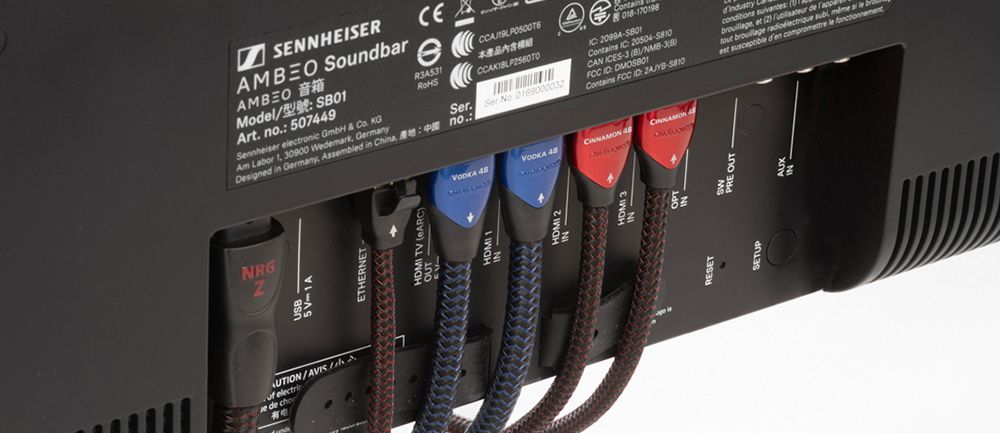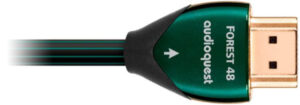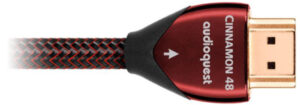
At Livewire, we’ve assisted hundredes families in Richmond and Central Virginia with cutting-edge audio-video and smart technology solutions. Our expertise ranges from crafting custom home theater projects to establishing comprehensive A/V systems for both homes and businesses. In the realm of A/V, a frequently asked question from our clients is, “How do I know which HDMI cable to buy?“
One of our goals is to empower you with knowledge, so you can comprehend the intricacies of technology. So, let’s delve into the specifics of selecting the right HDMI cable for your system.
How to choose the right high-quality HDMI cable.
In the world of electronics, cables are like the unsung heroes, quietly transmitting electrical signals between our devices. The magic behind this transfer lies in something called conductivity – a measure of how easily electrons can move through a material.
What is the role of conductivity in analog and digital signals?
Let’s talk about signals. Analog signals, like the ones in RCA cables, are like smooth, continuous waves representing sounds or images. Here, conductivity is crucial because resistance can lead to signal loss during the journey. Copper, with its fantastic conductivity, is often the go-to for RCA cables, helping to minimize signal loss along the way.
Digital signals found in high-definition multimedia interface (HDMI) cables use Transition-minimized differential signaling (TMDS) code, using 0s and 1s to convey information. Unlike analog, digital signals are less bothered by conductivity problems. However, High-speed HDMI cables, with top-notch conductivity and construction, can still play a role in preventing signal degradation and visual hiccups.
Copper vs Gold vs Silver: How to choose the metal for your HDMI cable.
- Copper: It’s a star – great conductivity and budget-friendly. You’ll find it in both analog and digital cables.
- Gold: Shiny and resistant to corrosion. Gold is frequently considered the standard, and takes the spotlight in connectors and terminals. Especially in fancy cables that aim for consistent conductivity over time.
- Silver: The champion of conductivity among common metals. Silver is the VIP of cables. Silver often makes an appearance in high-end cables for its exceptional signal transfer. But, watch out, it can tarnish and needs some extra care.
Signal integrity is important in HDMI cables.
It’s all about a signal maintaining its quality and strength as it travels. Digital signals are more robust, but hey, everyone needs a little care. High-quality HDMI cables with superb conductivity and construction are the superheroes here. To ensure the signal reaches its destination without distortion, a high-quality cable is designed to minimize signal loss and interference.
Key to understanding HDMI performance lies in its bandwidth capacity.
Bandwidth refers to the amount of data that can be transmitted over a connection in a given amount of time. In the realm of HDMI, it’s measured in gigabits per second (Gbps). The higher the bandwidth, the more data can be transferred, enabling higher resolutions, faster refresh rates, and richer audio experiences.
For instance, if you’re content with standard 1080p resolution, a basic HDMI cable with a bandwidth of 4.95Gbps will suffice. However, if you’re craving the immersive experience of 4K UHD content, you’ll need a cable with at least 18Gbps of bandwidth. And for the pinnacle of home entertainment – 8K resolution – you’ll require a cable that can handle the massive data streams of 48Gbps.
How to choose the right HDMI to future proof your system:
- 1080p Standard – Standard HDMI cables have a bandwidth of 4.95Gbps.
- 4K Ultra HD – High Speed HDMI cables have a bandwidth of 18Gbps.
- 8K Ultra HD – Ultra High Speed HDMI cables have a bandwidth of 48Gbps.
So, when selecting an HDMI cable, consider the type of content you’ll be viewing and the capabilities of your devices. A good rule of thumb is to always opt for a cable with a bandwidth that exceeds your current needs, ensuring you’re ready for the future of high-definition entertainment.
What length of HDMI cable should I choose?
The length of HDMI cable you should use depends on the distance between your devices. It is generally recommended to use the shortest cable possible to minimize signal loss. However, HDMI cables can be up to 50 feet long without any significant problems.
Choose the right shielding to improve your HDMI cable performance.
Picture this: you’re sending current through an HDMI cable, and along the way, some voltage gets lost due to resistance – that’s voltage drop. Voltage drops lead to fluctuations in signal strength. And can show up as pixels going haywire or even weird visual artifacts. That’s where shielding comes in. It’s like a protective cloak for high-quality HDMI cables. Guarding against electromagnetic interference (EMI) that could mess with the signals.
Should I choose gold HDMI Connectors?
HDMI connectors are the unsung heroes of signal integrity. Gold-plated HDMI connectors, with their resistance to corrosion, make sure the connection between the cable and the device stays solid.
Conductivity is a big deal for cable performance, especially for analog signals. Whether it’s analog or digital, having top-notch cables with clean, reliable data transmission involves using quality materials, protective shielding, and connectors. It’s like ensuring a smooth highway for your data to travel on.
Benefits of choosing high-quality HDMI cables for smart home users.
In the smart home, where a seamless flow of data is crucial for the optimal performance of your devices, using high-quality cables is no longer a luxury but a necessity. Here are some of the key benefits of investing in high-quality cables for your smart home setup:
- Enhanced Device Performance: High-quality cables ensure that your smart devices receive the data they need to function optimally. This translates to faster response times, smoother operation, and an overall more enjoyable smart home experience.
- Reliable Connectivity: With high-quality cables, you can bid farewell to annoying connection drops and glitches. Robust construction and superior conductivity ensure that your smart devices remain connected and responsive, even in demanding situations.
- Minimized Signal Interference: In a smart home environment, where multiple devices are operating simultaneously, signal interference can become a major issue. High-quality cables are designed to minimize interference, ensuring that your smart devices can communicate clearly without any disruptions.
- Future-Proof Investment: As smart home technology continues to evolve, high-quality cables will remain compatible with future devices and advancements. This means you won’t have to worry about constantly replacing your cables as new technologies emerge.
Conclusion
In the world of smart home technology, where every device is connected and every signal matters, investing in high-quality cables is a wise decision. By choosing cables that are built with superior materials, offer reliable connectivity, and minimize interference, you can ensure that your smart home functions seamlessly, providing you with the ultimate connected living experience.
Need help choosing the right HDMI cable for your project? If you decide to work with us, Livewire’s design engineers will make sure you have the correct high-quality HDMI cables for your project.
Some of the areas we serve include:
Livewire serves customers all throughout Central Virginia. If you don’t see your city or town listed here, please contact us to find out if we can accommodate your needs.

















 CALL US 804.616.4156
CALL US 804.616.4156 BOOK APPOINTMENT
BOOK APPOINTMENT